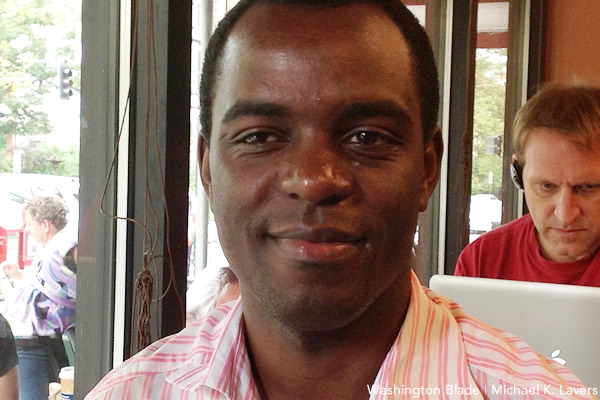Eastern Europe
Anti-LGBTQ Hungarian prime minister declares victory in country’s elections
Referendum on LGBTQ issues also took place on Sunday
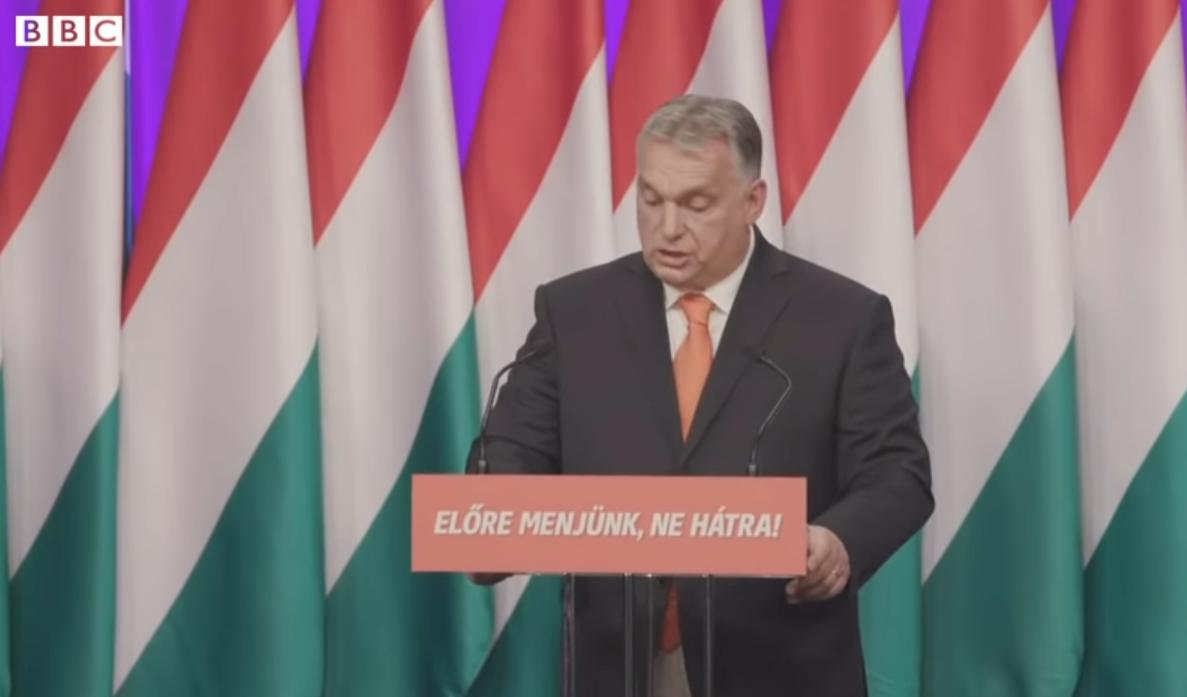
Declaring himself the winner with 91 percent of the votes counted in the national parliamentary elections Sunday evening, Hungarian Prime Minister Viktor Orbán addressed supporters and members of his Fidesz Party telling the enthusiastic crowd it was a “huge victory.”
“We won a victory so big that you can see it from the moon, and you can certainly see it from Brussels,” Orbán said referring to his ongoing battles with the European Union.
Orbán’s Fidesz party has a good chance of being re-elected.
“The whole world has seen tonight in Budapest that Christian democratic politics, conservative civic politics and patriotic politics have won. We are telling Europe that this is not the past, this is the future,” he added.
Once the results are confirmed and Orbán settles in for his fourth consecutive term as prime minster, it is almost certain that recent tensions between him and the leadership of the European Union, especially over the question of LGBTQ civil rights, will continue to escalate.
Further adding tension has been Orbán’s longtime close relationship with Russian President Vladimir Putin. The prime minister has insisted that Hungary remain neutral in the Russian leader’s war on neighboring Ukraine, although Hungary has maintained close economic ties with Moscow, including continuing to import Russian gas and oil on favorable terms.
Orbán, although he had previously condemned the Russian invasion, has refused to participate in assisting Ukraine or allowing EU and NATO members to ship much needed supplies, including weapons, across Hungarian borders to Ukraine.
At his final campaign rally Friday, the Associated Press reported that Orbán claimed that supplying Ukraine with weapons — something that Hungary, alone among Ukraine’s EU neighbors, has refused to do — would make the country a military target, and that sanctioning Russian energy imports would cripple Hungary’s own economy.
“This isn’t our war, we have to stay out of it,” Orbán said.
Ukrainian President Volodymyr Zelenskyy told western media representatives on Saturday that Orbán is out of touch with the rest of Europe, which has united to support sanctions against Russia and sent aid including weapons assisting Ukraine in its fight against Russian aggression.
“He is virtually the only one in Europe to openly support Mr. Putin,” Zelenskyy said.
Peter Marki-Zay, the man who challenged Orbán in national elections on April 3 on behalf of a united opposition, warned of worsening isolation under Orban’s “illiberal” model and likened him to a “traitor” putting Hungarians at risk. Marki-Zay in an interview with RFE/RL’s Hungarian Service said; “Let’s for once be on the right side of history, for once on the winning side.”
Critics have charged that there will be further erosion of civil rights and democratic norms, especially for Hungary’s LGBTQ community which has been under relentless attack from the Orbán government and the Fidesz Party over the past nearly three years.
“We have heard a lot of nonsense recently about whether there is democracy in Hungary,” Orbán’s State Secretary Zoltán Kovács told reporters in recent interviews. “Hungarian democracy in the last 12 years has not weakened, but been strengthened.”
Lawmakers in December 2020 approved proposals that would effectively ban same-sex couples from adopting children and define marriage as between a man and a woman. That same year parliamentarians from the the Fidesz Party approved a bill that would prevent transgender and intersex people in the country from legally changing their gender.
A law that bans the promotion of homosexuality and sex-reassignment surgery to minors in Hungary took effect in 2021.
“The homophobic and transphobic amendments to the law, which came into force on July 8, 2021, stigmatize LGBTQI people, deprive LGBTQI youth of information that is vital to them, and illegally restrict freedom of speech and the right to education,” said the Háttér Society, a Hungarian LGBTQ rights group.
On Aug. 6, Orban’s government issued a decree that restricts the sale of children’s books with LGBTQ-specific themes.
Orban has garnered the admiration of right-wing nationalists across Europe and North America including Fox News’ Tucker Carlson who traveled to Budapest. Carlson at the opening of his show described Orbán as “an elected leader who publicly identifies as a Western-style conservative.”
Carlson referred to transgender athletes and critics of President Biden’s policies as he introduced his interview with Orbán. The Hungarian prime minister, for his part, defended his record.
“The Western liberals cannot accept that inside the Western civilization there’s a conservative national alternative, which is more successful at everyday life and the level of it than the liberal ones,” he added. “That’s the reason why they criticize us. They are fighting for themselves, not against us. But we are an example that somebody, or a country which is based on traditional values, on national identity, based on a tradition of Christianity, could be successful or sometimes even more successful than a leftist liberal government.”
The European Commission last year announced it would take legal action against Hungary after a law that bans the promotion of homosexuality and sex-reassignment surgery to minors took effect.
“I’m treated like the black sheep of the European Union,” Orbán told Carlson.
Along with the election to parliament, a referendum on LGBTQ issues was being held Sunday. The questions pertained to sex education programs in schools and the availability to children of information about sex reassignment.
“Orbán’s policy in the last 12 years has always been to pick a target and then start to shoot,” Anna Szlavi, co-founder of the Qlit network, an organization and website for gay women in Hungary, told The Daily Beast in a March 29, 2022 interview.
“In 2021 the so-called ‘pedophile law’ was introduced, which basically kind of conflated the LGBT+ [community] with pedophiles,” Szlavi says. “Orbán repeatedly upholds this idea that [being] LGBT is an abnormal thing and it’s OK to equate them with pedophiles.”
Eastern Europe
LGBTQ Ukrainians bear brunt of psychological toll amid ongoing war
Saturday marks two years since Russia invaded country
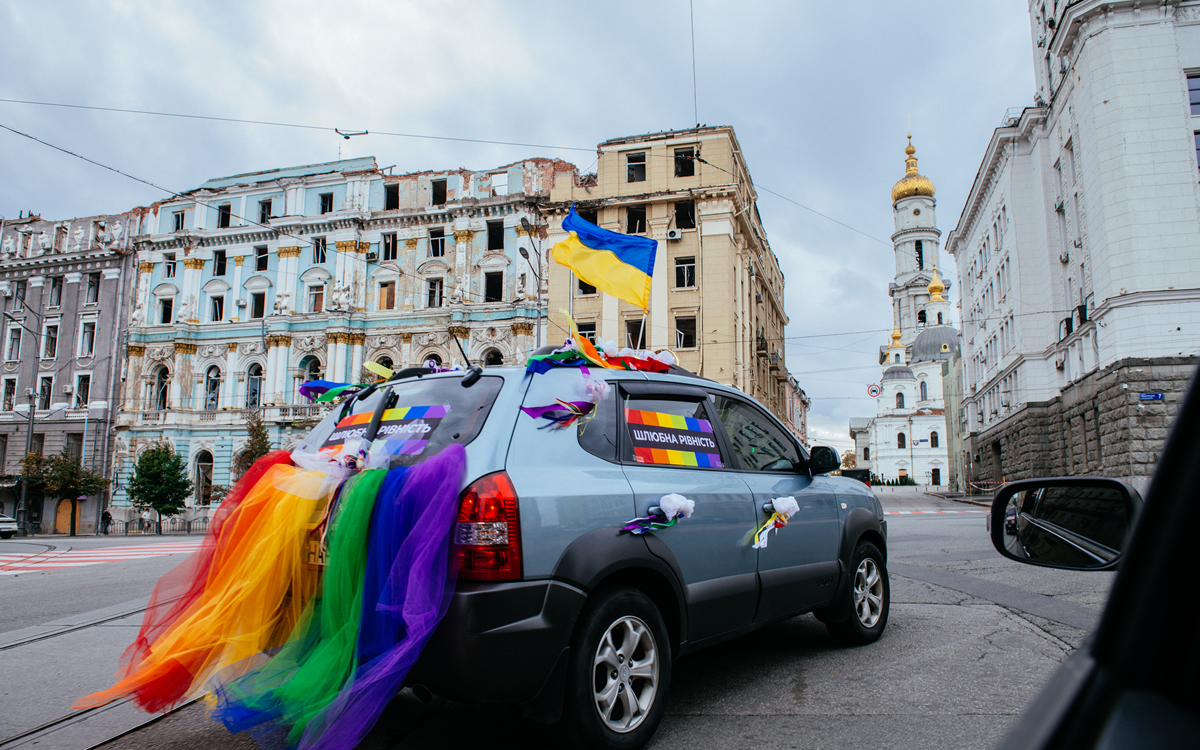
As Ukraine weathers Russian missile attacks and endures a harsh winter, the psychological consequences on its LGBTQ community are emerging as a distressing and often overlooked aspect of the conflict.
Recent reports from Human Rights First, based on their visits to the northeastern Ukrainian region of Kharkiv, shed light on the profound emotional impact experienced by LGBTQ individuals amid the sustained Russian aggression.
Saturday marks two years since Russia’s full-scale invasion of Ukraine began. Throughout this time, Human Rights First has sought to bring human rights into the heart of the discussion surrounding the conflict, offering support to human rights defenders, activist organizations, and individuals profoundly affected by the war.
Human Rights First last November initially surveyed Kharkiv to understand how communities were preparing for the harsh winter. Returning last month they found the LGBTQ community faced not only the physical challenges of extreme temperatures but also the hidden harm of severe psychological distress.
Human rights defenders on the forefront were documenting war crimes and supporting marginalized communities, including LGBTQ individuals. They emphasized the critical need for specialized psychological support within this community.
Vasyl Malikov, a key figure in Kharkiv-based LGBTQ NGOs Alliance.Global and Spectrum Women’s Association in Kharkiv, spoke about the increasing requests for psychological assistance and counseling.
Malikov highlighted the urgent need for both psychologists and a more comprehensive education about mental health and trauma issues.
“Some counseling can be done online, and it’s better than nothing, but what’s really needed is face-to-face time with a psychologist. Of course, that’s resource-intensive,” Malikov said, underscoring the unique challenges faced by the LGBTQ community.
Associate Professor Taras Zhvaniia, collaborating with Alliance.Global, shared insights into the growing demand for psychological support within the LGBTQ community. Initially addressing trauma in children, the scope expanded to include adults grappling with anxiety, depression and other emotional challenges related to the ongoing conflict.
Zhvaniia detailed the psychological struggles unique to the LGBTQ community, ranging from anxiety and panic attacks to specific fears such as reluctance to sleep in beds at home, avoiding bomb shelters and apprehension about routine activities during shelling.
Efforts to increase psychological knowledge for the general population are underway, yet the escalating demand for LGBTQ-focused support outpaces available resources. Human rights defenders have proposed measures, including funding for online counseling and visits by foreign psychologists, specifically tailored to address the psychological impact on the LGBTQ community.
The silent struggle faced by the LGBTQ community in Kharkiv and beyond necessitates international attention, according to Human Rights First. The organization added the lack of adequately trained psychologists raises concerns about the unaddressed psychological impact, underscoring the urgency for U.S. officials and the international community to comprehend and respond to the unique challenges faced by LGBTQ individuals in the midst of the ongoing conflict.
Eastern Europe
LGBTQ community in Kharkiv braces for another winter at war
Ukrainian city is 30 miles from Russian border
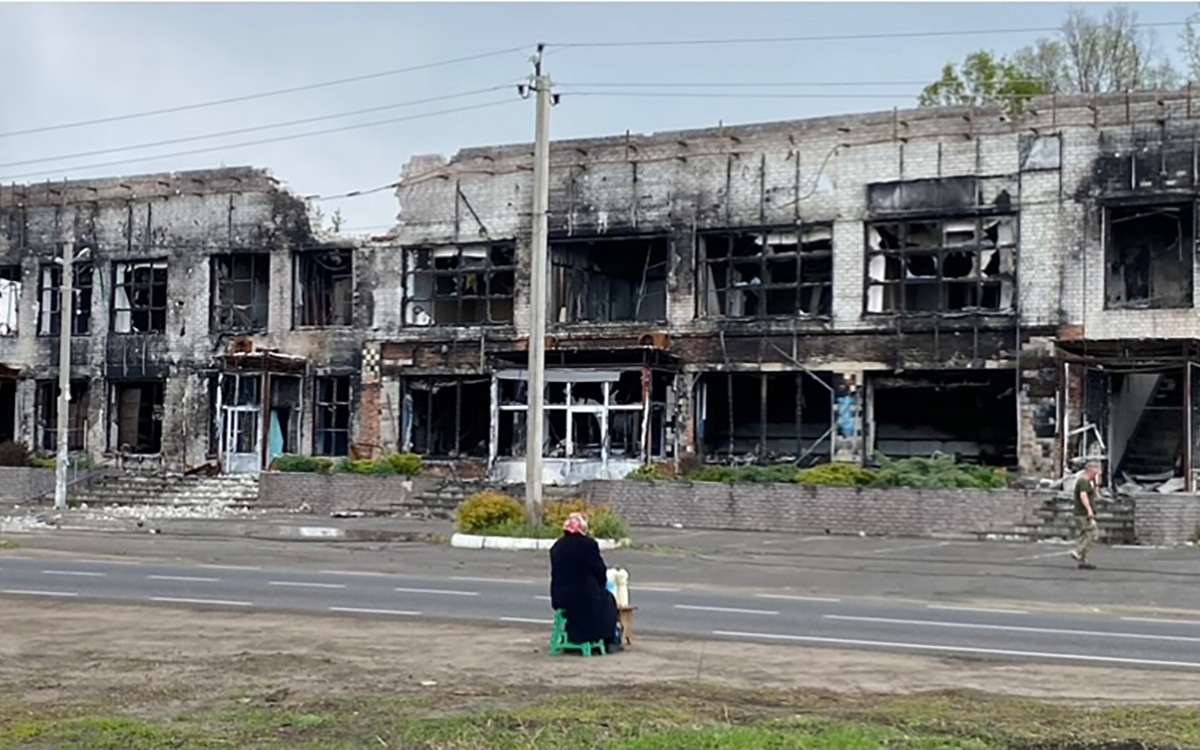
KHARKIV, Ukraine — Only 30 miles from the Russian border, Kharkiv is Ukraine’s second biggest city and was a key target of Russia’s invasion in February last year, when it was almost encircled.
I have been reporting regularly from Kharkiv since last year’s full-scale invasion, and the city is still often bombed by Russian missiles. United States government officials rarely come here because of the security situation. As temperatures plummet, Russia is targeting Ukraine’s heating infrastructure.
It hopes to make life unbearable for people in Ukraine’s cities and force another wave of mass movement out of Ukraine and into Poland and other European countries.
Attacks on Ukraine’s energy grid have begun, and some communities in the city have been particularly vulnerable since Russia’s invasion last year, and are facing a difficult winter.
Vasyl Malikov of the Kharkiv-based LGBTQI NGOs Alliance.Global and Spectrum Kharkiv has been distributing packages of hygiene goods, food and vouchers for humanitarian aid since last year. He helped to set up a new shelter for LGBTQI people and their relatives in the city.
“There are government shelters, and the authorities say they don’t discriminate against who uses them, but we know from lived experience that these official shelters aren’t always welcoming places for LGBTQI people. They feel vulnerable and are harassed there,” Malikov said. “We thought about setting up a shelter last year, but the situation seemed too uncertain and it wasn’t that easy to find premises, but we have gone ahead now and we can offer accommodation for up to 16 people to stay for up to three months.”
Some of those in the shelter are fleeing areas of conflict on the front lines, others have fled domestic violence, and others have been driven away by families who refuse to accept them. Some people, in Kharkiv for medical appointments, stay for days, others stay for weeks or months.
The shelter is a large apartment that has a kitchen and a large room where workshops and social events are held. It is on a block near a metro station which, Malikov says, is a useful place to run to in case of heavy bombardments.
Crucially, a new generator has arrived, which should heat the shelter during power outages. It’s a dual fuel model that can run on diesel or gas and costs around $2,000.
“This is a safe place for LGBTQI people and their families,” explains Malikov. “We shouldn’t have to set up our own facilities, the authorities should be doing this work, but we have to because they don’t.”
Other NGOs are also filling gaps that local authorities are failing to provide. The NGO Sphere has, since 2006 “been uniting women of Kharkiv, including lesbian and bisexual women.”
Tucked in a small office near the city center, some of Sphere’s activists described how their work has adapted to meet the challenges of the war.
“We’ve been providing aid for those forced to flee their homes because of the war,” says Yevheniia Ilinska, a long-standing member of the organization. “We’ve raised money from abroad — including from LGBTQ+ groups — to distribute basic supplies. We’ve been handing out clothes, including socks, and have provided some to our military.”
Sphere’s activists say that beyond its obvious damage and destruction to the city, the war is causing “a social revolution:” many men are away from their homes fighting in the military, and many family dynamics are changing dramatically.
The activists fear a spike in domestic violence when soldiers return home, a phenomenon witnessed in other countries.
“The full-scale war significantly aggravates some of the problems that existed before, including gender-based domestic and sexual violence, and discrimination at work,” Sphere notes on its website.
The war has also helped change some attitudes towards LGBTQ+ people in Ukraine. Last September, when the dangers from rocket attacks made an open-air parade impossible, Sphere helped organize a successful Pride event in the city’s metro system.
“We dressed wearing national symbols and LGBT flags,” says Ilinska. “And the public reception was very positive.”
The reaction is more evidence of a positive shift since last year’s invasion in public attitudes towards LGBTQ+ people, in part because the community’s contribution to the war effort is increasingly seen and valued. Hopes are high that Ukraine will soon legalize same-sex civic partnerships, and eventually same-sex marriages.
But for now, the cold is an immediate challenge. Sphere is raising funds to offer locals a safe place so that “in the event of rocket attacks and power outages, LGBTQ+ people will be able to stay warm indoors, have a hot drink, take a shower, and do laundry,” says Ilinska.
“We’re constantly adapting our work,” says Ilinska. “Adapting our advocacy and our public events, and our projects on targeting humanitarian aid. Kharkiv is changing and so are we, we have to react to this dramatic crisis, to the invasion, and we’re proving that we and our community can resist,” she said.
For more, see Human Rights First’s new report, Ukraine’s Winter War, written by Maya Fernandez-Powell and myself.
Eastern Europe
Transgender soldier from US named Ukrainian military spokesperson
Sarah Ashton-Cirillo was journalist before she enlisted
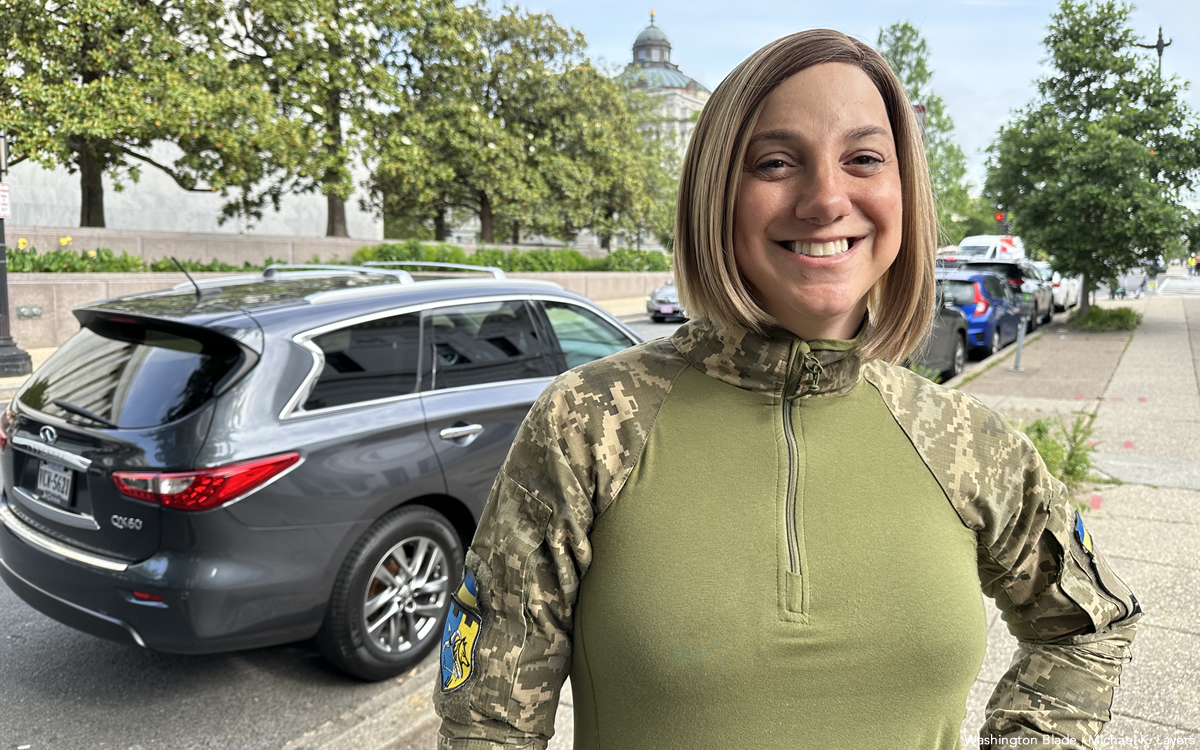
The Armed Forces of Ukraine have named a transgender soldier from the U.S. as one of its English-speaking spokespeople.
The Kyiv Post, an English-language newspaper, last week in a tweet noted Sarah Ashton-Cirillo “has become one of the speakers for the Defense Forces.” Deputy Defense Minister Hanna Malyar is among those who praised Ashton-Cirillo.
“Sara informs the English-speaking audience — she objectively covers the events of the Russian-Ukrainian war, debunks Russian fakes and propaganda,” said Malyar, according to the Kyiv Post. “Sarah’s audience reach on Twitter alone was 28.3 million users. So, the enemies get excited on hateful social networks, of course. However, this has only increased Sarah’s audience.”
Ashton-Cirillo was a journalist when she began to cover the Armed Forces of Ukraine’s Kharkiv Defense Forces at the beginning of Russia’s war against the country in 2022. She eventually enlisted, and a commander from the Defense Ministry on Jan. 31, 2023, facilitated her transfer to the unit’s 209th Batallion of the 113th Brigade.
Ashton-Cirillo, who was born in New York, was working as a senior combat medic in a trench near Kreminna in eastern Ukraine on Feb. 23, 2023, when shrapnel from an enemy artillery shell wounded her. Ashton-Cirillo suffered injuries to her right hand and to her face, and her fellow soldiers had to wait seven hours to evacuate her. Ashton-Cirillo eventually received treatment for her injuries in Kharkiv, Ukraine’s second-largest city that is roughly 130 miles northwest of Kreminna.
The Washington Blade spoke with Ashton-Cirillo in May while she was in D.C.
“The big key there was I wasn’t able to take any painkiller by staying in the trench because I was still technically in battle,” she recalled. “Seven hours after my injury, I finally got to a hospital.”
Ashton-Cirillo on Tuesday told the Blade her “new role within the Armed Forces of Ukraine is a position that has been earned due to my performance on the physical and informational battlefields.”
“What this means is that in today’s Ukraine being a part of the LGBTQ community is neither a benefit nor hindrance, but simply an accepted part of whom a person is,” she said. “The vocal support shown by LGBTQ groups in Ukraine, such as Gender Stream, Kyiv Pride and Ukraine Pride, upon news of this taking place, along with the statement of confidence in me issued by the Ukrainian Ministry of Defense and Deputy Defense Minister Hanna Maliar, made me understand that this battle for the country’s liberation is not about tolerance or acceptance for any one group but freedom and liberty for all Ukrainians.”
-

 Africa5 days ago
Africa5 days agoCongolese lawmaker introduces anti-homosexuality bill
-

 District of Columbia1 day ago
District of Columbia1 day agoReenactment of first gay rights picket at White House draws interest of tourists
-

 World5 days ago
World5 days agoOut in the World: LGBTQ news from Europe and Asia
-

 Arizona1 day ago
Arizona1 day agoAriz. governor vetoes anti-transgender, Ten Commandments bill





